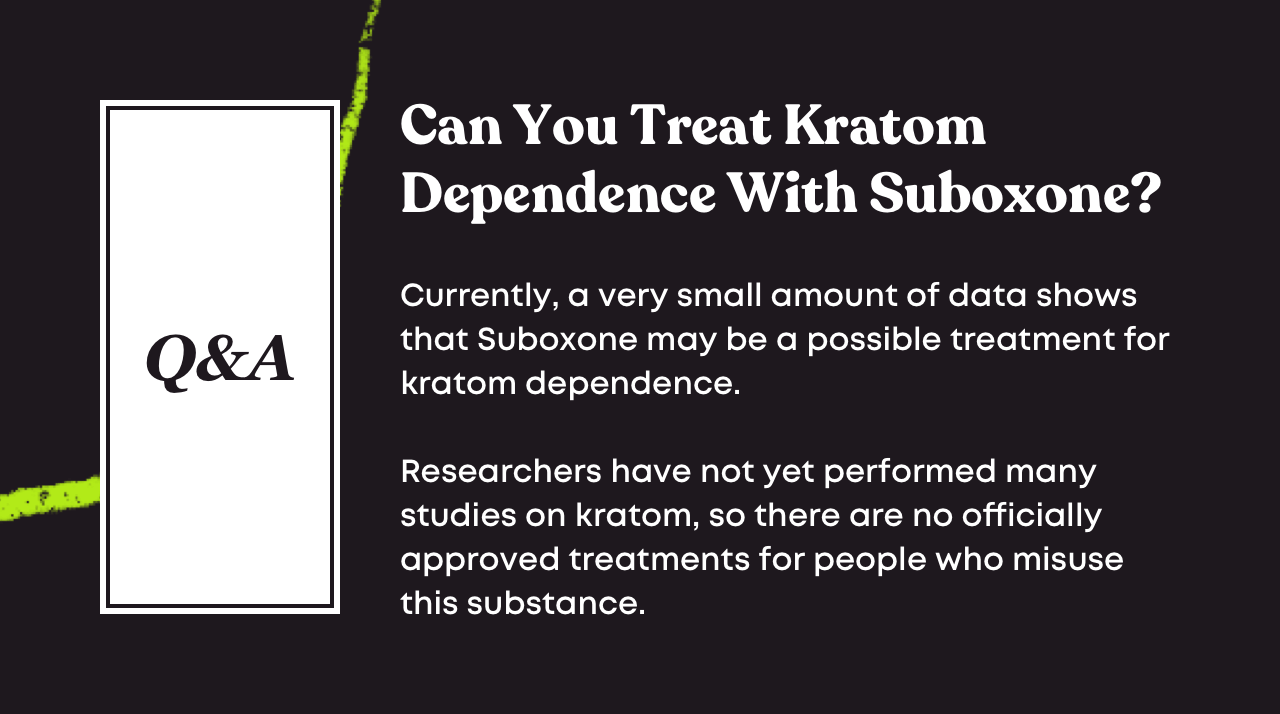
Since kratom works similarly to opioid drugs, some people try to use Suboxone to help treat kratom dependence. However, there is currently little research on using Suboxone to treat kratom dependence.
While Suboxone is approved by the U.S. Food and Drug Administration for the treatment of opioid use disorder (OUD) and kratom acts in part like an opioid, it's not clear if Suboxone is the right therapy for people using Kratom.
If you're struggling to give up kratom, talk with your doctor about what to do next.

Can You Treat Kratom Dependence With Suboxone?
Currently, a very small amount of data shows that Suboxone may be a possible treatment for kratom dependence.
Kratom, or Mitragyna speciosa, is a tree found in Southeast Asia. Historically, people brewed kratom leaves into tea or chewed the leaves. Currently, kratom may come in the form of a powder, tablet, capsule, or extract.[1]
Within the brain, kratom acts partially like an opioid drug. Mitragynine and 7-hydroxymitragynine, two chemicals found in kratom leaves, attach to opioid receptors, affecting how the brain perceives pain, pleasure, and tiredness.[1]
Researchers have not yet performed many studies on kratom, so there are no FDA-approved treatments for people who misuse this substance.[2]
However, a few doctors have published case reports describing successfully using Suboxone to treat a patient with kratom dependence. A recent scientific paper found a total of eight people who had undergone this treatment.[3]
So far, no clinical trials have analyzed Suboxone treatments in people undergoing kratom withdrawal. Because of this, no guidelines describe how to use this treatment safely or effectively.
What Happens if You Combine Kratom & Suboxone?
The effects of combining kratom and Suboxone are not well understood. Although there have been a couple of cases in which a person with kratom dependence was treated with Suboxone, there is not enough information to know how safe or effective the drug combination will be.
It is important to note that combining kratom with other drugs can have harmful or even fatal health effects.[2]
Avoid taking multiple substances unless a health care provider directs you to do so.
Risks of Treating Kratom Dependence With Suboxone
Kratom dependence is serious. Unfortunately, there's not enough evidence to suggest Suboxone can help individuals struggling with kratom. And since combining kratom and Suboxone is potentially dangerous, you would be hard pressed to find a physician who would prescribe Suboxone for this indication at the current time.
Suboxone is approved by the FDA for the treatment of OUD. It is used by people undergoing Medication for Addiction Treatment (MAT).
Suboxone comes as a film or tablet that is placed under the tongue. It contains two different medications: buprenorphine and naloxone.[4] These medications interact with opioid receptors in the brain, blocking opioid drugs from activating the receptors.
The drug doesn’t lead to an opioid high, but it does help to reduce opioid cravings. Suboxone can also lessen symptoms of opioid withdrawal, helping stabilize people physically so they can work on recovery. [4]
Suboxone is legal and safe to consume when prescribed by a health care provider. People should follow their doctors’ instructions when using Suboxone and not stop taking the medication without discussing it with their doctor.

Is It Safe to Use Kratom for Suboxone Withdrawal?
Some people try to use kratom to help control opioid dependence or withdrawal symptoms. They believe that kratom helps to reduce cravings or manage opioid withdrawal symptoms. However, there is currently no data that suggests kratom is effective when used in this way.[2] Using kratom can lead to other problems too.
Side Effects
Kratom use may lead to several unpleasant side effects, which include the following:[2]
- Nausea or vomiting
- Loss of appetite
- Constipation
- Itchiness
- Sweating or chills
- Dry mouth
- Needing to urinate more than usual
- Difficulty breathing
- Depression
- Hallucinations
- Seizures
Kratom-related deaths have also been reported in people who used other substances, such as caffeine, alcohol, and diphenhydramine (an allergy medication).[2]
Contamination
Because kratom products are not regulated, there is no guarantee that they are safe. The FDA has reported finding potentially dangerous substances, including heavy metals and salmonella, in kratom products sold by various companies.[5,6]
Heavy metal poisoning could lead to additional side effects, including high blood pressure, kidney damage, and increased cancer risk. A salmonella infection can cause fever, abdominal pain, and diarrhea.
Overdoses
In some cases, kratom can cause overdose. Kratom has been linked to multiple deaths in recent years. In one study, researchers from the U.S. Centers for Disease Control and Prevention (CDC) analyzed data from 11 states between July 2016 and December 2017. They found that kratom was involved in 91 overdose deaths.[7] Many people who overdosed had also used fentanyl or other opioids, heroin, benzodiazepines, or cocaine.
Kratom Withdrawal
People who take kratom may experience physical dependence.[2] Over time, their body becomes used to the drug, and they may need more of it to feel an effect. When they stop using it, they experience symptoms of withdrawal.
Kratom withdrawal may include: [8]
- Insomnia and tiredness
- Muscle aches and pains
- Twitchy or shaky movements
- Dilated pupils
- Nausea
- Diarrhea
- Sweating or chills
- Runny nose
- Panic
- Emotional changes, including feeling more restless, irritable, or aggressive than usual
These kratom withdrawal symptoms typically disappear within a few days.
How to Find a Suboxone Treatment Provider
If you're looking for help with substance misuse, talk with your doctor. Explain what drugs you're taking and how much you use. Together, you and your doctor can develop a plan that is right for you.
If you're misusing opioids or Kratom and want to stop, Suboxone is a good option. Use the Substance Abuse and Mental Health Services Administration practitioner locator to find a provider near you.





.webp)








